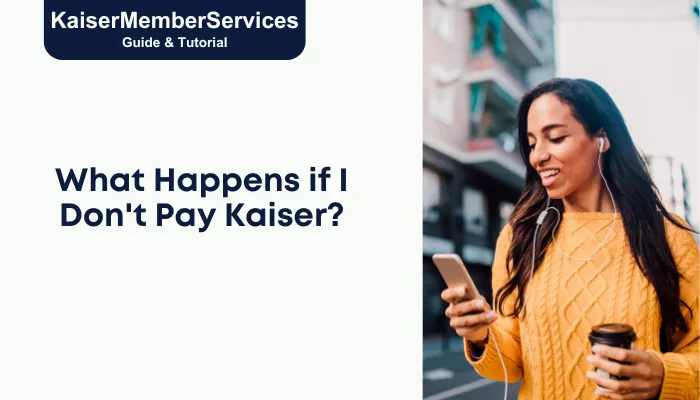When I first signed up with Kaiser Permanente, I was thrilled about the comprehensive care and streamlined services. But life happens, and sometimes, keeping up with medical bills can feel overwhelming. The question is, What happens if I don’t pay Kaiser? It’s a question many ask when facing financial strain.
I’ve been there, and through my experience, I’ve learned how the Kaiser Member Services Login portal handles unpaid bills and what steps you can take to manage the situation. This guide shares my journey to help you understand the consequences and options if you’re struggling to pay.

Understanding Kaiser Permanente’s Billing System
I’ve navigated Kaiser’s billing system, and it’s straightforward but strict. Let’s break down how it works to set the stage for what happens if you miss payments.
Kaiser Permanente operates as both an insurance provider and a healthcare system, so I deal directly with their facilities for most care. This means my bills come from Kaiser, not third-party providers, which simplifies things but also ties my coverage tightly to payment compliance. Here’s what I’ve learned about their billing:
- Monthly Premiums: I pay these to maintain active coverage. Missing these can lead to serious consequences.
- Copays and Coinsurance: For each visit or service, I owe a set amount based on my plan.
- Deductibles: Some plans, like mine, require me to meet a deductible before coverage kicks in fully.
Missing any of these payments triggers a process that I’ve seen unfold. Let’s dive into what happens if I don’t pay Kaiser and how they respond.
Before we move on, understanding this system helps me prepare for the financial responsibilities and avoid surprises with unpaid bills.
Consequences of Not Paying Kaiser Permanente
I’ve faced moments where paying my Kaiser bill felt like a stretch, so I dug into what happens if I don’t pay Kaiser. The consequences escalate over time, and here’s how they typically unfold:
1. Initial Notifications and Grace Periods
When I miss a payment, Kaiser doesn’t immediately penalize me. They send reminders via email, mail, or through the kp.org portal. I’ve received texts or calls nudging me to settle my balance. For those with premium tax credits, Kaiser offers a three-month grace period for monthly premiums:
- First month: Kaiser covers my claims as usual.
- Second and third months: They may hold off on paying claims until I clear the outstanding premiums.
If I don’t act, the situation gets more serious, which I learned the hard way. This initial leniency gives me time to address the issue, but ignoring it leads to bigger problems.
2. Suspension of Coverage
If I don’t pay my premiums during the grace period, Kaiser may suspend my coverage. I experienced this once when I missed two months of premiums. My access to non-emergency services, like scheduling appointments or refilling prescriptions, was restricted. Emergency care remained available, but I had to pay out of pocket, which was a shock.
- Restricted Services: Routine checkups, specialist visits, and elective procedures are off-limits.
- Emergency Care: I can still visit an ER, but costs pile up without coverage.
This suspension taught me to prioritize communication with Kaiser to avoid losing access to care.
3. Termination of Membership
If I continue to ignore payments, Kaiser can terminate my membership entirely. I’ve seen this happen when I didn’t address overdue premiums for three months. Termination means I lose all coverage, and re-enrolling often requires settling the outstanding balance plus a waiting period. This happened to a friend who had to reapply and faced delays in regaining coverage.
- Loss of Benefits: No access to Kaiser’s network, doctors, or pharmacies.
- Re-enrollment Challenges: I may need to clear debts and wait for open enrollment.
This step is a wake-up call, pushing me to act before losing my healthcare lifeline.
4. Debt Collection and Credit Impact
If I don’t pay Kaiser for services like copays or deductibles, the unpaid bills may go to a collections agency. I’ve heard from others that Kaiser sells unpaid debts to third-party collectors, who then pursue me aggressively. This can damage my credit score, making it harder to secure loans or housing.
| Action | Impact |
|---|---|
| Bill sent to collections | Credit score drops significantly |
| Collection agency contact | Frequent calls, letters, and stress |
| Legal action (rare) | Potential wage garnishment or liens |
I avoided this by setting up a payment plan, which I’ll cover later. These consequences hit hard, but knowing them helps me plan to avoid long-term financial damage.
Options to Manage Unpaid Kaiser Bills
When I faced trouble paying my Kaiser bills, I explored options to avoid the worst outcomes. Here’s what worked for me and what you can try:
1. Contact Kaiser Member Services Immediately
I learned that reaching out to Kaiser member services (1-800-464-4000) is the first step. They’re available 24/7 for most issues, and I’ve found them helpful when I explain my situation clearly. Here’s what I do:
- Call or visit a Kaiser facility to speak with a representative.
- Explain my financial hardship honestly.
- Ask about payment plans or financial assistance programs.
This proactive approach often prevents escalation, and I’ve secured manageable payment plans this way.
2. Apply for Medical Financial Assistance
Kaiser’s Medical Financial Assistance (MFA) program saved me during a tough period. If my income is low (e.g., under 400% of the federal poverty guideline in California), I qualify for reduced or waived copays and prescriptions. I applied through kp.org or by calling member services, providing my income details.
- Eligibility: Varies by state; in California, a family of four earning less than $120,000 may qualify.
- Benefits: Waived copays, reduced prescription costs, and sometimes OTC drug coverage with a prescription.
This program eased my burden and kept my care accessible.
3. Negotiate a Payment Plan
When I owed $2,000 for an ER visit, I asked myself, “What happens if I don’t pay Kaiser?” and realized negotiating a payment plan was a smart move. I contacted Kaiser member services and offered to pay $50 monthly, which they accepted, as long as I stayed consistent. Medical debt doesn’t accrue interest, which was a relief. I called member services, reviewed my bill for errors, and proposed a plan that fit my budget.
- Tip: Request an itemized bill to dispute incorrect charges.
- Strategy: Offer a lump sum for a discount (e.g., $1,500 to settle a $2,000 bill).
This approach kept collectors at bay and preserved my credit.
4. File a Grievance for Poor Service
If I feel overcharged due to poor care, I file a grievance through member services. I once disputed a $300 charge for a five-minute visit, citing inadequate service. While Kaiser rarely reverses charges, documenting issues can lead to fee reductions or better care in the future.
These options empowered me to take control and avoid the worst consequences of non-payment.
Tips to Avoid Payment Issues in the Future
After navigating these challenges, I adopted habits to stay on top of my Kaiser bills. Here’s what I recommend:
- Set Up Autopay: I enrolled in autopay on kp.org to ensure premiums are paid on time.
- Check Bills Carefully: I review every bill for errors and dispute them promptly.
- Use the Kaiser App: I track appointments, bills, and messages to stay organized.
- Budget for Healthcare: I set aside funds for copays and deductibles to avoid surprises.
- Communicate Early: If I foresee payment issues, I contact member services before missing a due date.
These steps keep my coverage active and stress levels low. Preventive habits make all the difference, ensuring I stay covered without financial strain.
Conclusion
Dealing with unpaid Kaiser bills can feel daunting, but I’ve learned that what happens if I don’t pay Kaiser doesn’t have to spiral out of control. By understanding the consequences—like notifications, coverage suspension, or debt collection—and taking proactive steps like contacting member services, applying for financial assistance, or setting up payment plans, I’ve managed to keep my healthcare intact.
This guide reflects my journey to help you navigate yours. With the right approach, you can avoid the pitfalls of non-payment and maintain access to Kaiser’s care.
